
A re you wondering how to rank for multiple keywords in a single blog post?
It’s not as overwhelming as it sounds. In fact, it’s pretty easy to rank for multiple keywords and explode your organic traffic.
Even if you’ve just started a blog, by including related keywords and synonyms in your content, instead of focusing on a single keyword, you can bring in loads of new traffic.
In this guide, I’ll show you exactly how to rank for multiple keywords, including how to find related keywords and how to add them in WordPress.
Ready? Let’s get busy.
In This Guide:
How to Rank for Multiple Keywords: Key Takeaways
Here are the key takeaways on how to effectively rank for multiple keywords and enhance your organic traffic:
- Understanding Keywords: Keywords are phrases used by people during searches that can lead them to your blog. Optimizing your blog posts to target related keywords and their synonyms helps your site appear on the first page in search engine results.
- Meta Keywords Redundancy: Meta keywords are no longer relevant in SEO. Modern search engines like Google use advanced AI to understand content without relying on meta tags.
- Optimizing for Multiple Keywords: To help your page rank for different keywords, integrate related keywords and synonyms into your content naturally. This approach helps fulfill different search intents.
- Keyword Research Tools: Use tools like LSIGraph, UberSuggest, and Ahrefs to find related and LSI (Latent Semantic Indexing) keywords. These tools assist in expanding your keyword strategy beyond the primary keyword.
- Long Tail Keywords Strategy: Target long tail keywords, which are less competitive and more specific, increasing the chances of attracting targeted traffic to your blog.
- Prioritizing Your Primary Keyword: While targeting multiple keywords on a single page is beneficial, your primary individual keyword should remain the main focus to ensure strong ranking potential.
- Creating Multiple Related Posts: Develop several posts with relevant content on related topics and link them internally to establish authority and improve SEO performance.
- Using WordPress for SEO: Employ plugins like All in One SEO (AIOSEO) to manage and optimize multiple keywords efficiently within your WordPress content.
By following these strategies, you can effectively enhance your site’s visibility and attract more traffic by ranking for multiple keywords.
But let’s dive deeper into the topics below:
What Are Keywords?
Before I explain how to rank for multiple keywords, let’s give you a crash course on what keywords are.
Keywords are phrases or search terms that users type into search engines like Google to find what they’re looking for.
For example, if you’re looking to buy a good pair of headphones, then you might search for “best headphones for music.” Even though the phrase has more than one word, it’s still a keyword.
And when people search for specific keywords, your blog can show up on SERPs (search engine results pages). This makes it easy for people to discover your blog online.
But this doesn’t magically happen by itself. You need to optimize your blog posts with relevant search queries and synonyms.
For example, if you search for “blog structure,” Blog Tyrant will appear at the top of search results because we optimized for that keyword.

Ranking for your desired keywords won’t be easy if you haven’t done your keyword research. You need to spend a reasonable amount of time looking for keywords that have the potential to bring your blog lots of traffic.
Keyword research isn’t as difficult as it sounds. Check out our beginner’s guide on how to do keyword researc for more in-depth information.
Show me how!Now that you know what keywords are and why they are important, let’s talk about meta keywords and their role in modern-day search engine optimization.
Spoiler alert: it’s non-existent!
Do Meta Keywords Still Matter?
Back in the old days, SEO specialists used to spam content pages by adding keywords in the meta tags.
You could add a meta keywords tag on a page and tell the search engines what the page is about. Back then, search engines weren’t smart enough to understand the intent of the content. So, you were basically telling Google to rank your site for any keyword you added.
Here’s what they would look like if we were in the 1990s:
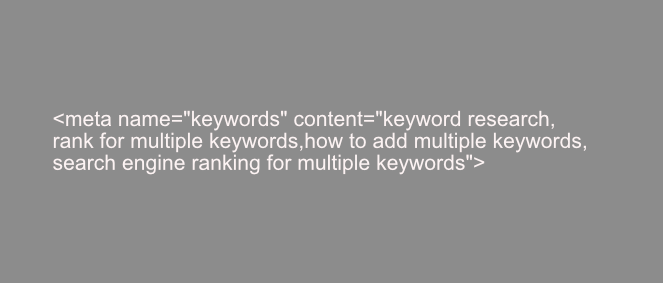
Sounds like a pretty easy way to rank for multiple keywords, right?
But now, since people were spamming this keywords element, search engines are ignoring it completely.
Google and other search engines are now relying on AI (artificial intelligence) to understand the content, and with time, it’s only going to get smarter.
As a figure of speech, you could say that AI killed the meta keywords tag, and it’s gone for good.
While meta keywords don’t matter anymore, you still need to optimize your content with keywords.
In the next section, we’ll show you exactly how to rank for multiple keywords.
How to Rank for Multiple Keywords
Search engines today love content that satisfies the search intent of the user.
Search intent, also known as user intent, is the purpose behind an online search. In other words, why did the person make this search?
Here’s an infographic to explain the 4 common types of search intent:
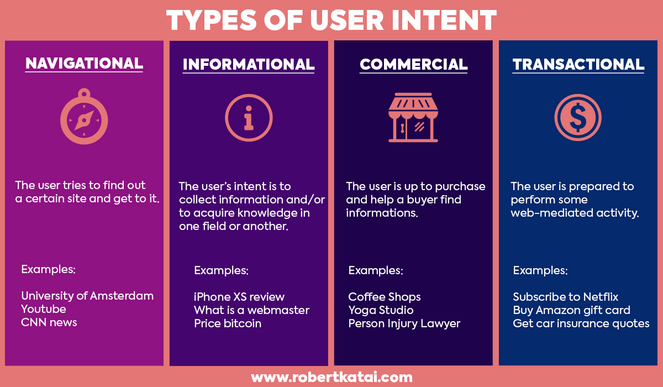
So, if a user types “how to make a pizza” into Google, that’s an informational search. They want to learn how to make a pizza themselves; they’re not looking for a pizza restaurant to order delivery from.
Your blog posts need to match the search intent of users and answer all of their questions if you want to rank for that search query.
Once you focus on the search intent, you’ll want to add other relevant keywords in your blog post in order to rank for multiple keywords.
And you can easily rank for multiple keywords if you know how to find related keywords and how to optimize them.
In this section, I’ll show you how to do that.
But before I get to that, let’s take a look at an example of our guide on blog post style that ranks for multiple keywords.
Keyword # 1: “Blog Post Style“
This is our primary keyword for our blog post style guide, and we have the top spot for it.
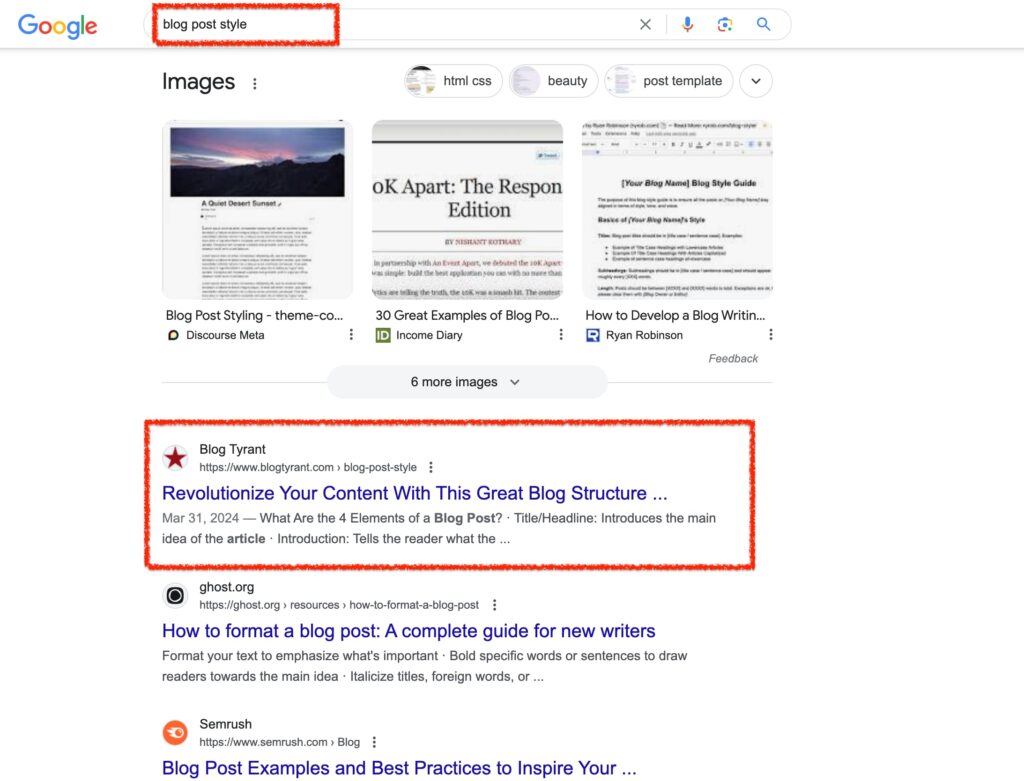
Keyword # 2: “Structure of a Blog”
For this keyword, we’re also ranking in the 1st position. We’ve even snagged a featured snippet! This keyword also brings us a good amount of search traffic.
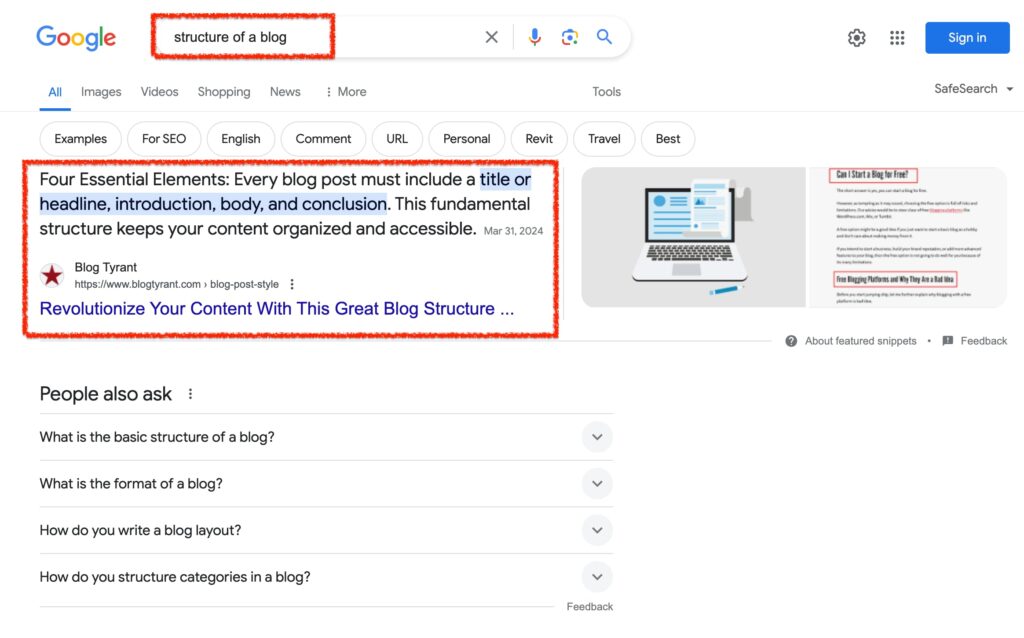
Keyword #3: “Blog Structure”
For this search query, we’re again ranking in the 1st position.
Overall, this guide on blog post style is ranking for 81 keywords!
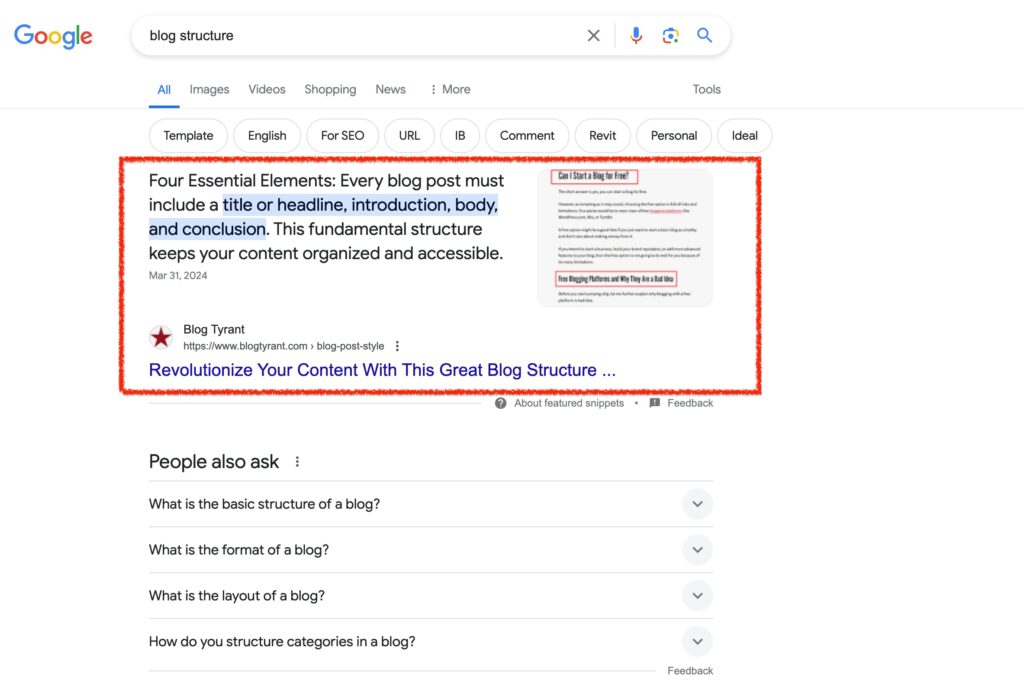
Now, I’m going to tell you how to rank your blog posts for multiple keywords.
Use Synonyms and LSI Keywords
Using synonyms and LSI (latent semantic indexing) keywords can help you rank for multiple keywords. LSI keywords are keywords that are semantically related to your target keyword.
In the example above, I showed you that we were ranking for multiple keywords.
We simply looked for synonyms and LSI keywords and used them naturally throughout our content.
If you’re writing content on The Teenage Mutant Ninja Turtles, you would use words like Leonardo, Donatello, Splinter, Shredder, and others that are related to the main topic.
Here’s how you can find LSI keywords for your blog:
1. Use Keysearch LSI Keywords Generator

Keysearch LSI Keywords Generator is a free tool that lets you search for LSI keywords related to your primary keyword. All you need to do is insert your keyword in the search bar, as shown in the image below, and LSI Keywords Generator will generate one, two-word, and three-word keywords for you for free!
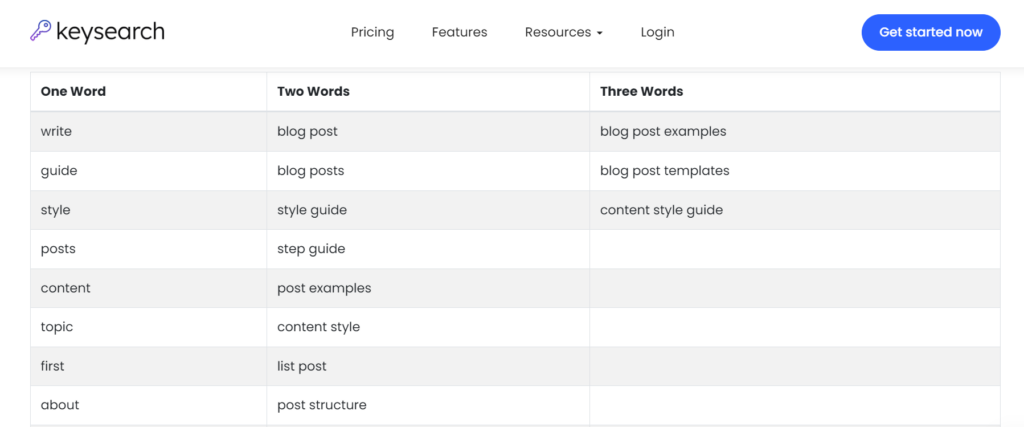
2. UberSuggest
UberSuggest is another free tool that lets you find LSI keywords for your blog posts.
Enter the keyword you want to search for in the search bar, and then click on “keyword ideas.”

Then, you’ll get a list of keyword ideas that are related to your target keyword.

Just make sure that you aren’t stuffing these keywords into your content; otherwise, Google will penalize you, and you won’t rank for any keyword at all.
The best way to avoid this is to write for your readers first. You need to focus on satisfying their search intent by answering all their questions.
If you do that, you won’t have to worry about stuffing keywords into your content, as you will be using them naturally to begin with.
3. Ahrefs
We’ve saved the best for last. Ahrefs is our favorite keyword research tool because of its in-depth features.
To get started, all you need to do is go to the Keyword Explorer and enter the keyword you want to search for.

Once Ahrefs shows the results on the next page, click on Having Same Terms on the left-hand menu.

Ahrefs will then show you a list of keywords that are related to your primary keyword.

You can now go through these keywords and shortlist the ones that are related to your primary topic.
But that’s not all. Ahrefs takes this one step further by also showing you search suggestions. Notice when you start typing your search query in Google, it starts to give you suggestions based on your search query.

These keywords are very important because they are being suggested by Google itself. You should try your best to include these in your blog post.
Scraping these directly from the search engine can be difficult, but with Ahrefs, you can easily get a list of these keywords.
Click on Search Suggestions on the left-hand menu, and it will list all the keyword suggestions.

Now that you know how to find LSI keywords, it’s time to get to work and build a list around your main keyword and plug them into your content.
Target Long-Tail Keywords
Long-tail keywords are keywords that have more than 3 words. They usually have very low competition and are easy to rank.
Although the search volume of these keywords is usually low, if you manage to get ranked for these keywords, you will get targeted traffic.
For example, “best blog hosting for travel bloggers” may not have a lot of searches, but it’s very targeted.
If you have covered this in your blog post, you will be fulfilling the search intent of the user. And it can help you get the affiliate marketing commission for the hosting provider that you recommend.
So, if you want to rank for multiple keywords, you need to look for long-tail keywords. And the best way to do this is to search for your keyword on Google and then scroll to the bottom of the page.
At the bottom, you will find the Related Searches section. Copy these keywords and add them to your list of keywords.
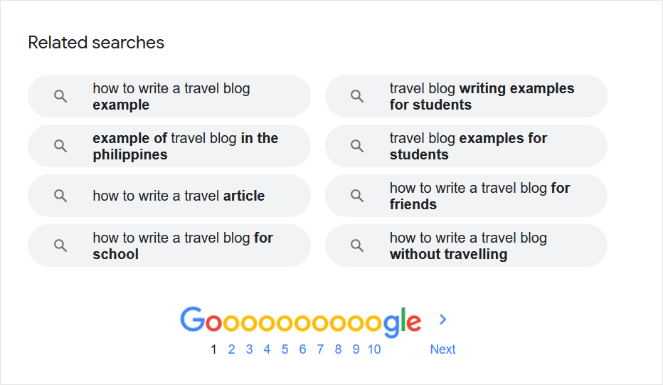
Focus on Your Primary Keyword First
While using synonyms and related keywords in your blog posts will help you rank for multiple keywords, always focus on your primary keyword first.
Because the key to ranking for multiple keywords is to rank for one keyword very well.
You need to identify the primary keyword in your blog post that has the highest chance of ranking for the top 3 positions and then include LSI and synonyms related to that keyword.
Make sure you practice the basic SEO practices. Use the primary keyword in your URL, titles, headings, and meta description, as well as in your content.
Ranking well for your primary keyword has a spillover effect. Your content will start ranking highly for different variations of your primary keyword and also for the LSI keywords that you have used in your content.
Create Different Blog Posts on The Same Topic
The best way to rank for multiple keywords is to write long-form content. I’m talking about content pieces with more than 2000 words. But writing a 2000-word article is difficult, and it takes a lot of time and effort.
An alternative approach would be to write different blog posts on the same topic, and internal link them.
Internal linking is an SEO practice that involves linking to your own blog posts using relevant anchor text.
For example, we linked to our guide on keyword research earlier in this blog post using the anchor text “how to do keyword research.” This anchor text is relevant to the main topic/keyword of this article (and thus follows internal linking best practices).

Using related anchor texts helps search engines build relevancy. And when you have many different blog posts related to the same topic, this shows Google that you are the authority on the subject.
Having authority over a certain subject can help you get ranked higher in SERPS.
So, after you’ve created a series of blog content on the keyword that you want to rank for, spend some time and compile them in a sheet and have them link to each other.
Let’s say you wrote a post on how to create a photography blog. Then you decided to cover topics related to photography like best cameras, how to start a vlog, best photography equipment, etc.
Add links in all of those blog posts to your main post (how to start a photography blog).
To make internal linking easier, you can use All in One SEO’s Link Assistant feature. It will automatically create a link report for your site and give you relevant internal linking suggestions that you can add to your content in 1-click.
Now, you know some tips on how to rank for multiple keywords, but if you aren’t optimizing your content with these keywords, you won’t end up anywhere.
In the next section, I’ll show you how to add multiple keywords in WordPress.
How to Add Multiple Keywords in WordPress
You can easily add and optimize multiple keywords in WordPress with All in One SEO (AIOSEO).

AIOSEO is the best SEO plugin for WordPress. It helps you optimize your site’s posts and pages for search engines step-by-step.
First, you need to install and activate the Pro version of AIOSEO.
There is a Lite version of AIOSEO available which is free to use. But, if you want to optimize your content with multiple keywords, you need the Pro version.
If you need help with the installation, then check out our guide on how to install a WordPress plugin.
Once you’ve installed and activated the plugin, go to the post you want to optimize with multiple keywords.
Scroll down to the AIOSEO Settings section at the bottom of the post and click on the General tab.

First, add your title in the Post Title section. Remember your post title should include your primary keyword. You can use the tags to insert variables into your title or write the title manually.

Next, scroll down to the Focus Keyphrase section and enter your main keyword.

Then, click the Add Focus Keyphrase button.
Once you’ve done that, you can add another related keyword that you found in the Additional Keyphrases box.

Once you click on the Add Additional Keyphrases button, AIOSEO will analyze the content on how well it’s optimized and give you recommendations based on the keyword you added.
As you can see below, AIOSEO gave us a few recommendations to improve our SEO.
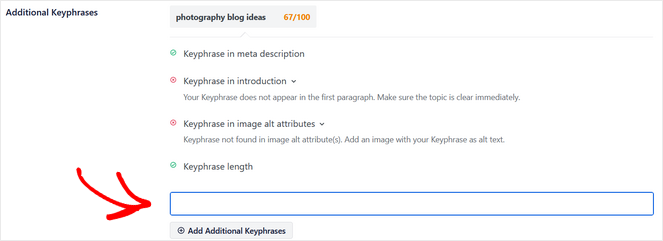
Another section will also appear where you can add more keywords.
It’s that easy to add multiple keywords with AIOSEO!
You can also use AIOSEO to help you improve the readability of your content. If your content is easy to read and it’s well structured, it helps you rank higher in search engines.
You can find the readability feature in the Page Analysis section.

Once you click on the Readability tab, AIOSEO gives you a list of recommendations that you use to improve your content’s readability.
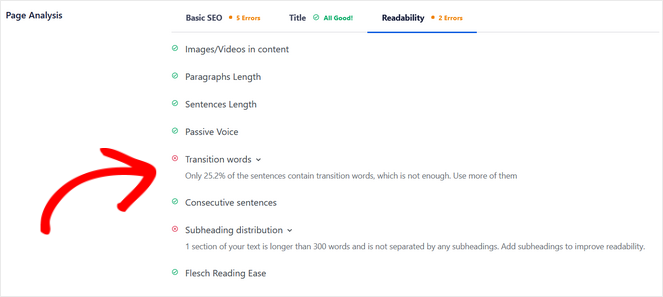
And there you have it!
You now know not only how to add multiple keywords in WordPress, but also how to optimize them in your content with AIOSEO.
Frequently Asked Questions (FAQs)
How Do I Rank More Keywords?
You can easily rank for more keywords by adding and optimizing keywords that are related to your main topic.
You can use tools like Ahrefs, UberSuggest, and LSIGraph to find related keywords.
And for optimizing your content, you should use AIOSEO as it makes it very easy to add multiple keywords in WordPress.
How Many Keywords Does Google Allow?
You can use as many keywords as you want in your content as long as they are not stuffed and are related to your topic. Keyword stuffing can get you penalized, so avoid it at all costs.
Can You Have Too Many Keywords in Meta?
Adding keywords in the meta keywords tag is an obsolete practice. As per Google and other search engines, this practice died in 2002. You don’t need to add a single keyword in the meta keywords tag.
However, you should always optimize the meta description with your main keyword.
What Will Happen If Too Many Keywords Are Targeted In a Single Landing Page?
Like I’ve mentioned before, if you use the keywords naturally, then it doesn’t matter how many keywords you use on a landing page.
If your intention is to stuff keywords, then it will cause you more harm than good. Just use your primary keyword throughout the content naturally, and you will rank for all the related terms once you start ranking for the primary keyword.
Final Thoughts on How to Rank for Multiple Keywords
We hope that this guide helped you understand how to rank for multiple keywords. Now you can start improving your rankings and boost traffic to your blog!
If you liked this guide, then also check out our post on the best SEO tools.
And don’t forget to sign up for our email newsletter so you can get helpful content like this sent right to your inbox!


amazing writeup, thanks for sharing. informative and helpful
Nice blog, good useful tips on ranking of keywords. Keep sharing.
Very informative
Ranking #1 on the google search result page is very hard. Giving the list of tools to use for keyword research is very helpful. Thanks for this blog. Looking forward to more learnings. 🙂
Awesome! I am using this article to share with my students while I m teaching keyword research.